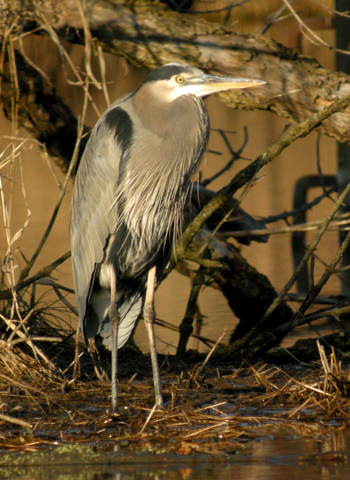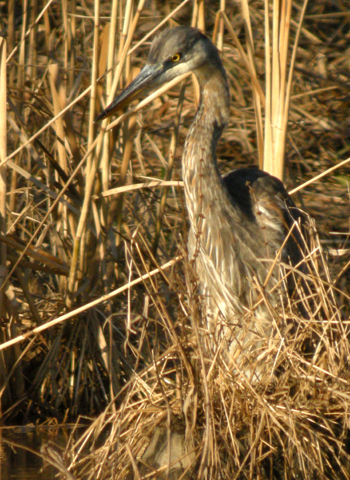Just a quick post to show that the author of this blog is still alive and alert. I have other posts in the works but I am a slow writer. Last Sunday I had planned a trip up to Hawk Mountain Sanctuary, which lies in the Pennsylvania Appalachians northwest of Allentown. But it was blustery and cold and I didn’t think it would be much fun on a mountain top.
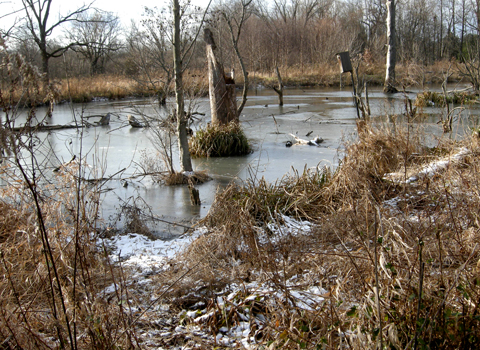
So I took my digiscoping gear to my favorite pond to see who might be around. Wind whipped at my hair, snapping it around, and my body was still settling itself into a thermo-regulatory comfort zone as I headed over. The pond certainly looked dead. Who was I kidding? Everyone’s going to be hunkered down. However, no place is ever really dead. Just because birds weren’t screeching and hopping up and down for my attention doesn’t mean nothing’s there. So, I repeated my mantra: you never know.
I circled around to my favorite end, where in the warmer months turtles bask on the fallen logs. We’d had snow the night before and while most of it had melted, there was still a thin crust of ice on the pond and snow patches tucked in depressions and coating some of the bigger logs. Usually I spend some time getting shots of the turtles. Not today, though.
Kept walking. Nice to get out, get some exercise. A person can’t expect birds to be there waiting just because she happens to have her scope along, and sometimes, the quiet is nice. I set the tripod and scope down and recalled how wild the pond gets in summer with all the Tree Swallows, Red-winged Blackbirds, flickers, and the transient Cedar Waxwings.

But even on this cold and windy day I knew something would come by or peep out, as did a little wren later on, although it disappeared before I could get a shot of it. And sure enough, a familiar cry echoed from the woods along the stream that runs behind the pond. A chunk of blue tore out from the trees across to a nice open perch on the limb of a dying Red Oak, and even before it landed I knew it was one of the Belted Kingfishers that have been hanging out here all fall.
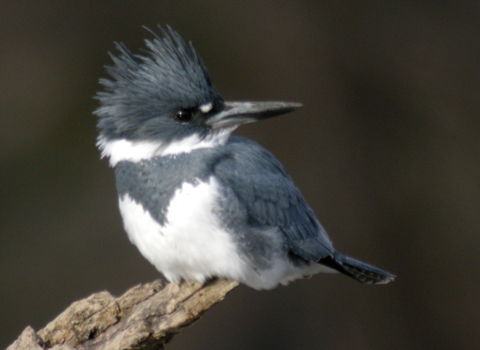
Great. They love this pond and will sit nicely on any one of their 4 favorite perches for long periods of time. Today it was the male that had come to fish. You can see how he has a plain white belly unlike the female with her wide rusty belt.
For some reason, even though I could see the bird in my LCD viewfinder, I couldn’t tell if it was in focus. I took a zillion shots and tweaked the focal ring now and then on the scope to increase the chance of some shots being clear. I am picking up new glasses next week with stronger bifocals on them. Let’s hope that helps.
About every 20 minutes the kingfisher, a male would plunge down for a fish. He sometimes flew behind a bush to eat his catch, the stinker, but I did get some shots when he deigned to eat in full view on a wood duck box.

The next 2 images are stills from a movie clip taken with the handy-dandy video on my Nikon P5100 point and shoot.

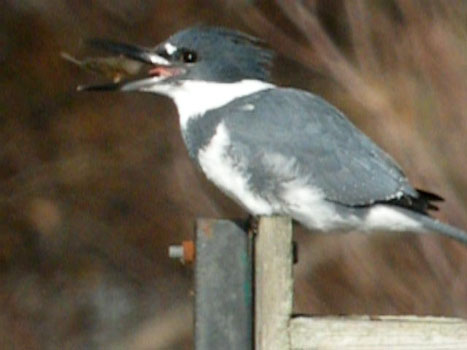
I could have taken pictures of that kingfisher all day, and not just because I wanted to secure at least one focused shot, but because these birds have great photogenic qualities; that crest and bill, for one thing.
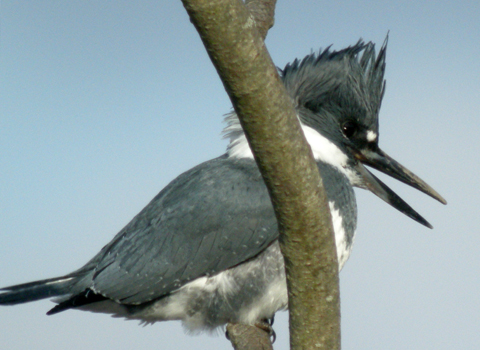
Although the photo quality is horrid and shameful, the shot (which is not a still from a video) does capture our friend in mid-squirt. It is a fine example of what photographers call the “decisive moment”. Kingfishers do this a lot. I’ve got videos to prove it. Must be that diet of fish.
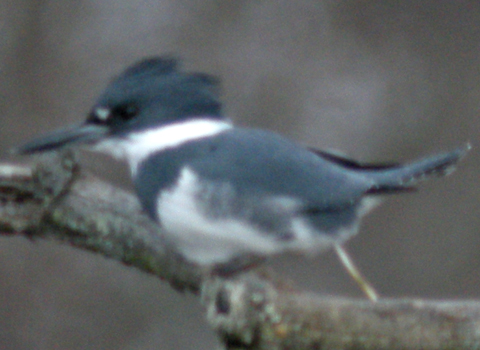
While I was taking a breather from the kingfisher, another bird graced me with its presence. My first thought before I could see it through the scope was that it was a kestrel. It was about that size, maybe a tad bigger. But through the scope I could tell something was different. I don’t know my raptors as well as I should, although I’m learning, so it took me awhile to wonder if this might not be a merlin.

When I got home I checked it in my Birds of North America (National Geographic) and turns out I was right. No obvious white cheek patch as on a kestrel. I’m going to say that this was my first “conciously aware” sighting of a merlin. I probably saw them in Colorado when I was living out there, but as I never was sharp with raptor ID, who knows?
When the merlin left, I focused back on the kingfisher. Although I thought I heard another kingfisher call from the woods at one point, I only saw the male that day. Below is a shot of the female from one of my earlier visits to the pond. Note her rusty belt.

Two hours had passed and I was beginning to get chilled and my 2nd camera battery was giving me a warning that it was pooped. On the way home I made a stop at the farm where my horse lives. After giving him a nice brushing and some treats, I found another fun bird to digiscope. Maybe you’ll recognize the feet from the puzzle that you did before reading this post. You did do the puzzle, right, and not just glance at the little picture on the left? Good for you.
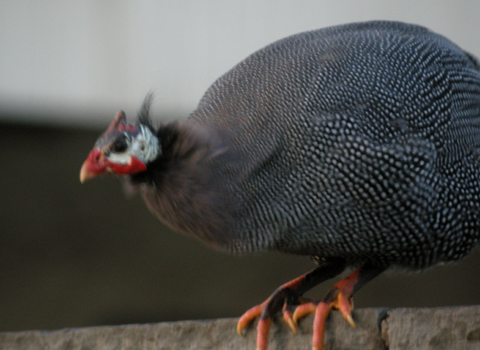
Guinea Fowl
You can look forward to more of these guys in future posts.
